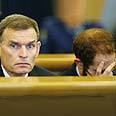
NZ politician on 'Mossad-lamb trade' cable: Ex-US envoy clueless
In response to leaked cable in which former ambassador accuses Wellington of over-reacting to 2004 arrest of Israeli agents to gain greater access to Arab world, Labor party chief says, 'He got the job because he's a big contributor to Republicans
Phil Goff, the leader of New Zealand's Labor party lashed out on Thursday at former United States Ambassador Charles Swindells for accusing Wellington of over-reacting to the 2004 arrest of two suspected Mossad agents who had allegedly tried to obtain New Zealand passports fraudulently.
In diplomatic cables released by Wikileaks, Swindells said New Zealand's government had "little to lose" by acting against Israel "and possibly something to gain in the Arab world... actively pursuing trade with Arab states".
Goff said Swindells was appointed ambassador to New Zealand because he was a "Republican Party funder," adding that the former American envoy did not understand diplomacy, and as a result fed wrong information about New Zealand to his government.
Goff said Swindells let his background as a financier influence how he saw foreign affairs.
"It's the norm for the Americans to appoint ambassadors that aren't professionals... Charles I think really suffered from a lack of knowledge and a lack of understanding of how countries work and what they do," he said.

Excerpt from leaked cable
"He had his job because he's obviously a big contributor to the Republican Party, he made the assumption because he thought about the world in a particular way other people might as well."
In another leaked cable, Swindells said New Zealand saw the "flap" as "an opportunity to bolster its credibility with the Arab community, and by doing so, perhaps help NZ lamb and other products gain greater access to a larger and more lucrative market."
In response, Goff said New Zealand's action against Israel was "a measured, appropriate and effective reaction. It had absolutely nothing to do with trade."
A spokesman for the American embassy in Wellington said, "Cables reflect the internal day to day analysis and candid assessments that feed the governments' foreign relations deliberations.
"These cables are often preliminary and incomplete expressions of foreign policy, and they should not be seen as having standing on their own or as representing US policy," he said.
- Follow Ynetnews on Facebook















